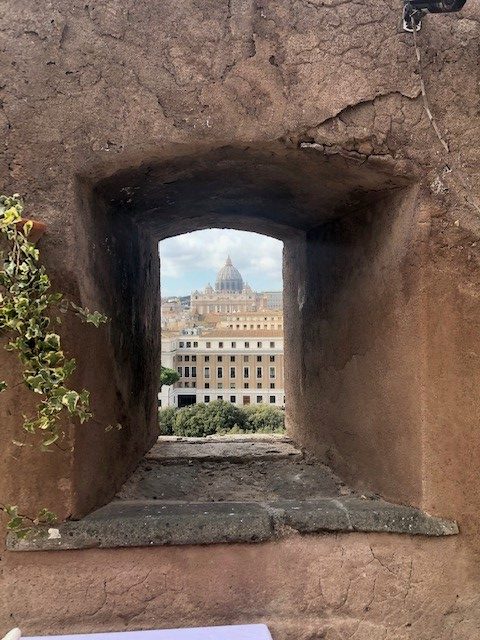
Read: Isaiah 40:1-11
The grass withers, the flower fades; but the word of our God will stand forever (Isaiah 40:8, NRSV).
This was the view from the window of my tiny, two room apartment in Rome the other night. Though I wasn’t clever enough to catch it on camera, there was a moment when the clouds draped over the bottom half of the moon’s face. Oh, for pity’s sake, I thought. Even the moon is wearing a mask. It was hard to know whether to laugh or cry at that point.
Still, the sight inspired me to search out a lullaby that a friend had sent me a few days before:
The moon is risen, beaming,
The golden stars are gleaming
So brightly in the skies;
The hushed, black woods are dreaming,
The mists, like phantoms seeming,
From meadows magically rise.
How still the world reposes,
While twilight round it closes,
So peaceful and so fair!
A quiet room for sleeping,
Into oblivion steeping
The day’s distress and sober care.
There is something so soothing about that image of the hushed world as a “quite room for sleeping.” And God knows, we could all use a bit of oblivion from “the day’s distress and sober care.”
But then the lullaby takes what—to modern ears—is a less comforting turn:
Grant that, without much grieving,
This world we may be leaving
In gentle death at last.
And then do not forsake us,
But into heaven take us,
Lord God, oh, hold us fast!
Ours is an age that does not dwell much on death. People rarely die at home any more, and when they do, their bodies are whisked off to funeral homes. In most places in the world, infant mortality is—thank God—much lower than in previous centuries. Perhaps these are some of the reasons most of us are out of touch with our own mortality. But even if we are in touch with it, we are not likely to slot the subject into our lullabies.
Enter the pandemic. Suddenly, Death, like a distant, distasteful relative, has shown up on our doorstep. It has brought a lot of luggage, and threatens an indefinite stay.
Short on spiritual resources to deal with this uninvited guest, it might make sense to turn to earlier centuries for help. Isaiah 40 comes to mind. I have often described this chapter to my students as God’s “lullaby to the exiles.” Comfort, comfort—it begins, and you can almost feel the exiles begin to relax in their heavenly Parent’s arms.
But Isaiah 40 has something else in common with lullabies of earlier centuries: it is utterly realistic about our mortality. “All people are grass,” it says candidly, and everyone knows that “the grass withers and the flower fades.” But here comes the comfort. Our lives may be short, but “the word of our God will stand forever.” Then the metaphor shifts. The point, however, does not. Our brief, fragile lives are held like lambs in the care of a Good Shepherd. “He will gather the lambs in his arms,” it says, “and carry them in his bosom.”
Perhaps the pandemic has put us in a better position to appreciate the candor of these lost lullabies. Suddenly, they strike us not so much as morbid, but realistic. Denial is a false friend. Our true comfort lies in the fact that we belong to an eternal God whose love will never let us go.
The person who sent me the lullaby about the rising moon is a pastor in Milan—the epicenter of Italy’s part of the pandemic. In an area roughly the size of Vermont, that region has lost over 12,000 people in the last two months. My friend is originally from Germany, and she told me that she takes great comfort in knowing that German Christians have started singing that old lullaby every evening at 7:30. If you read its final verse, you may find some comfort, too.
Lie down, my friends, reposing,
Your eyes in God’s name closing.
How cold the night-wind blows!
Oh God, Thine anger keeping,
Now grant us peaceful sleeping,
And our sick neighbor too.
Ponder: Did you grow up saying the “Now I lay me down to sleep” prayer? (That’s the one that ends with, “If I should die before I wake, I pray the Lord my soul to take.”) If so, did you teach it to your children? Why or why not? Has the pandemic changed how you feel about that prayer?
Pray: Pray these verses from the lullaby referenced above: Der Mond ist aufgegangen. It is by Matthias Claudius, and it was first published in Germany in 1779.
Grant that, without much grieving,
This world we may be leaving
In gentle death at last.
And then do not forsake us,
But into heaven take us,
Lord God, oh, hold us fast!
Lie down, my friends, reposing,
Your eyes in God’s name closing.
How cold the night-wind blows!
Oh God, Thine anger keeping,
Now grant us peaceful sleeping,
And our sick neighbor too.
Listen: Here are a few different settings of the lullaby, along with the full text of the poem in German and English.
- Der Mond ist aufgegangen-children’s version
- Der Mond ist aufgegangen-choral version
- Der Mond ist aufgegangen-contemporary version
- Der Mond is aufgegangen–German & English Text

Introduction to the Roman Roads Series
As many of you know, I am spending my sabbatical in Rome, Italy. Thanks to the coronavirus, it is turning out to be something less than a “Roman Holiday.” While a pandemic was not part of my original itinerary, it does lend a unique perspective to my writing these days. I offer these reflections along with my prayers for the health and safety of our world. May God bless and keep you all!
![]()
